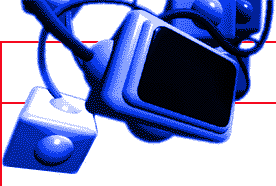EXPLORING MARS
Action-Pak
GOALS: The students should achieve an awareness of the importance of the planet Mars in human culture, and how this has motivated so much research into whether it has ever sustained life on its surface.
KEY CONCEPTS: Mars seen as a bringer of War and Misfortune, Other culture's views of Mars, Mars in astrology.
OVERVIEW: For thousands of years many different cultures have thought of Mars as the God of War and Battles. Is this true of all cultures? Over a hundred years ago, astronomers claimed to have found huge artificial waterways on Mars, and called them "canals". This made people think that Mars was inhabited by intelligent beings. Sometimes we thought of these beings as peaceful, sometimes as hostile. Space probes have shown us a different Mars from what we believed. This unit is meant to help you understand the reasons behind why we have always thought of Mars as so important. Use Libraries and the Web for reference.
PROCEDURE: Ancient atronomers in many cultures have thought of Mars as a dangerous, untrustworthy planet. To find out why this might be, do some research into how ancient astronomers viewed the heavens. Did they think of the sky in terms of planets and solar sytems the way we do? What features of Mars, as seen with the naked eye, might make people think of blood and war. Can you find some words to do with war which start "mar..."?
Find out the astrological symbol for the planets, in particular Mars. What does it look like? Can you design your own symbol for Mars, and the other planets? The symbols should say something about the astrological meaning of the planet.
Do an illustration of your idea of the God of War. Use any materials or technque you like.
The English composer Gustav Holst wrote a suite of music called "The Planets". If you can, get hold of it and listen to it. What sort of music would you write to describe Mars, or any of the other planets as Holst describes them?
Match the following names for Mars to the cultures which produced them:
Name for Mars:
- HAR DECH'ER
- THE FITFUL GLITTERER
- ANGARAKA
- NERGAL
- ARES
- MARS
Ancient Cultures:
- ROME
- GREECE
- CHINA
- EGYPT
- BABYLON
- INDIA
If you are working in the Southern hemisphere, can you find out what attributes the planet Mars has in your region? Are there any stories to do with Mars?
When the telescope was invented, astronomers could look at Mars in much greater detail, and they found that it had certain things which made it seem to be more Earth-like. Find out what you can about Christian Huygens, and what he discovered about Mars.
Can you find out which Italian astronomer first reported seeing what he called "canali " on the surface of Mars? What does "canali " actually mean?
The American astronomer Percival Lowell claimed to have discovered a huge network of canals all over Mars, and came up with the idea that Mars was inhabited by highly intelligent beings. These "Martians" were using canals to transport water from the north pole to the desert areas of the planet on the equator, because Mars was drying out, and their civilisation was dying. Make a model, or do a painting of a city on Mars, with canals running into it, or perhaps you might want to make a model of a dead Martian city, after the water has dried up.
The English author H. G. Wells wrote "The War of the Worlds". If you can, read it. Design a cover for the book, and illustrate it. What do you think the Martians looked like? Design a Martian Fighting Machine.
If there really were Martians, what do you think they would look like? Find out from the factsheet, or from the Web, or from books, what the surface of Mars is really like, and design a Martian to fit those conditions.
Imagine you could redesign Earth animals and plants to survive on Mars. What would they look like? What would you look like on Mars?
In the past thirty years there have been space probes to Mars. Find out what you can about them: Mariner 4, Mariner 9, Viking 1 & 2, Pathfinder. You can make a display based on one or more of these probes.
Can you design an arm to take a sample of soil, that you can operate from your school window?
OTHER WORK: Some astronomers said that the Martian canals were an optical illusion, caused by the eye's ability to link up unconnected features into connected lines. You can see if this is so, by taking a circle of red paper 15-20 cms in diameter; with a pen or paintbrush, flick a random set of splashes in green and grey across it, and then hang it up. Ask a friend to look at it from a distance, and tell you if s/he can see straight lines on the disk. If s/he can, could s/he be seeing Lowell's canals?
In the late 1970's, some researchers thought that they had found evidence for a "Face" on Mars, and for large, 5-sided pyramids. The recent Mars Global Surveyor probe showed these to be just eroded landforms, which looked like a face and pyramids because of the low resolution of the photographs, and the play of light and shade. Are there any landscape features in your area which look like something else - an oddly-shaped rock which looks like an old man perhaps, or an animal. What is its name, and does it have an interesting history?
Why do you think people want to find evidence of life on Mars? What does it show about us?
RESEARCH: Look up the following on the net, or in your library: Christian Huygens, Giovanni Schiaparelli Percival Lowell, Mariner 4, 6 and 7, Viking 1& 2, Mars Pathfinder, Sojourner, Mars Global Surveyor, The Lowell Observatory [Flagstaff, Arizona, USA]
RESEARCH SOURCES:
Books - Non-fiction:
- Martin Caidin: "Destination Mars: In Art, Myth and Science". Penguin Studio 1997
- Marc Carlotto: "The Martian Enigmas: A Closer Look" [Face on Mars etc]: North Atlantic 1997
- Peter Cattermole: "Mars, the Story of the Red Planet": Chapman and Hall 1993 [technical]
- Arthur C. Clarke: "The Sands of Mars" -various [first book on terraforming Mars.]
- Richard Hoagland: "The Monuments of Mars": North Atlantic 1987 [face etc]
- William Graves Hoyt: "Lowell and Mars": Univ. of Arizona 1996 [scientific biog. of Lowell and analysis of Mars Canal furore]
- Kieffer et al : "Mars"- Arizona 1992 [Analysis of Viking data, hefty and pricey text, but it's all there!]
- William Sheehan:"The Planet Mars": Arizona 1996 [one of best texts on early observation of Mars]
- Robert Zubrin: "The Case for Mars" : Free Press 1996 [how to go to Mars - now].
Books - Fiction:
- Kevin Anderson: "War of the Worlds: Global Dispatches" - Bantam 1996 [reports of the invasion]
- Stephen Baxter: "Voyage"- Harper Collins 1997 [JFK survives, and pushes for mission to Mars]
- Ben Bova: "Mars" - Bantam 1992 [realistic account of mission to Mars]
- Ray Bradbury: "The Martian Chronicles" - various [classic, poetic and evocative]
- Edgar Rice Burroughs: "Barsoom" books - various [classic stories of fictional Mars]
- Robert Heinlein: "Stranger in a Strange Land" - various [ important work]
- Ian McDonald: "Desolation Road" - Bantam 1988 [terraforming Mars]
- Kim Stanley Robinson: "Red Mars " - Bantam Spectra 1992 [the best of the three books. Long, with ludicrously compressed technological timetable, but excellent descriptive passages at the start of each chapter. Good stimulus material]
- H. G. Wells: "The War of the Worlds"- various [classic invasion text - notes are widely available]
Films:
- A Message from Mars 1912 - silent Flash Gordon:
- Mars Attacks the World - 1938
- Invaders from Mars 1953 - better than the later remake
- Red Planet Mars 1953 - Martians as communists
- The War of the Worlds 1953 - H.G.Wells meets California
- Robinson Crusoe on Mars 1964 - stranded astronaut finds company on Mars
- Lobster Man from Mars 1989 - comedy somewhat like Mel Brooks' "The Producers"
- Total Recall - 1990 - classified as 18 by many countries, but a reasonable rendering of Mars.
- Mars Attacks 1996 - comedy
Listening:
- Orson Welles' 1938 "War of the Worlds" radio play [available on audio cassette]
- Gustav Holst - "The Planets Suite" - music based around the astrological aspects of the planets.
- Jeff Wayne - "The War of the Worlds" musical.
Return to Previous Page
Click here to return to the Exploring Mars Lessons Index
|





